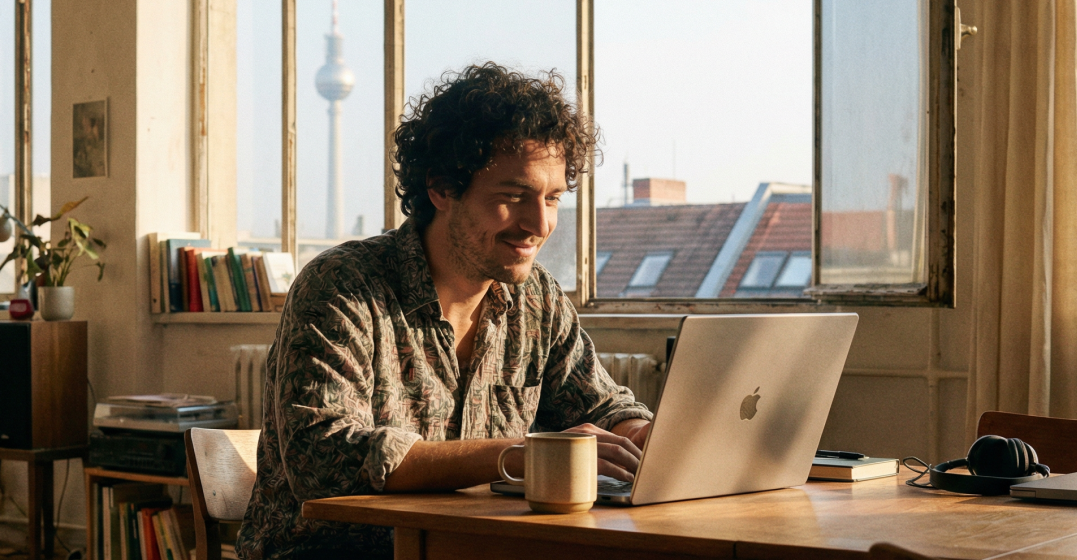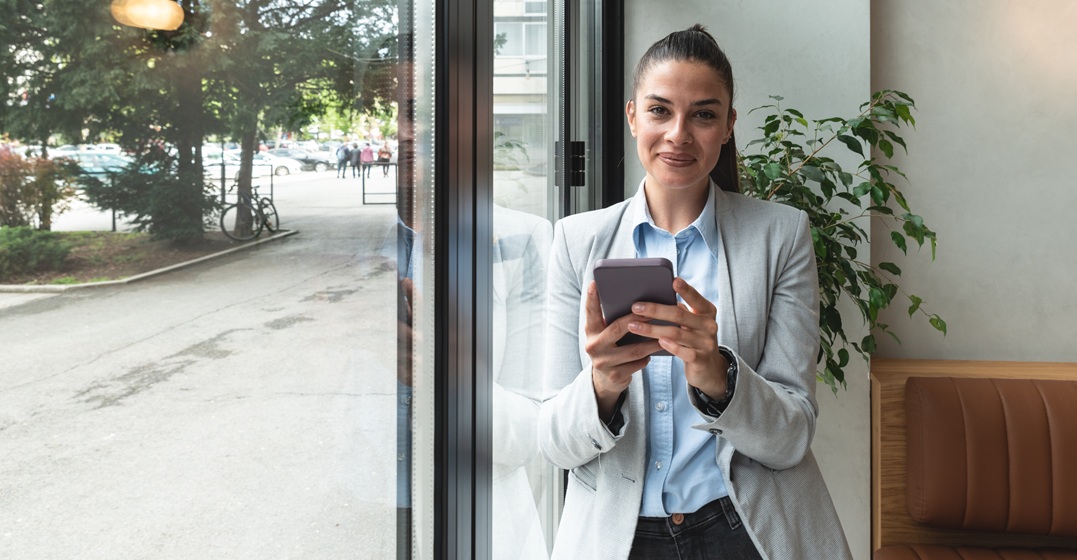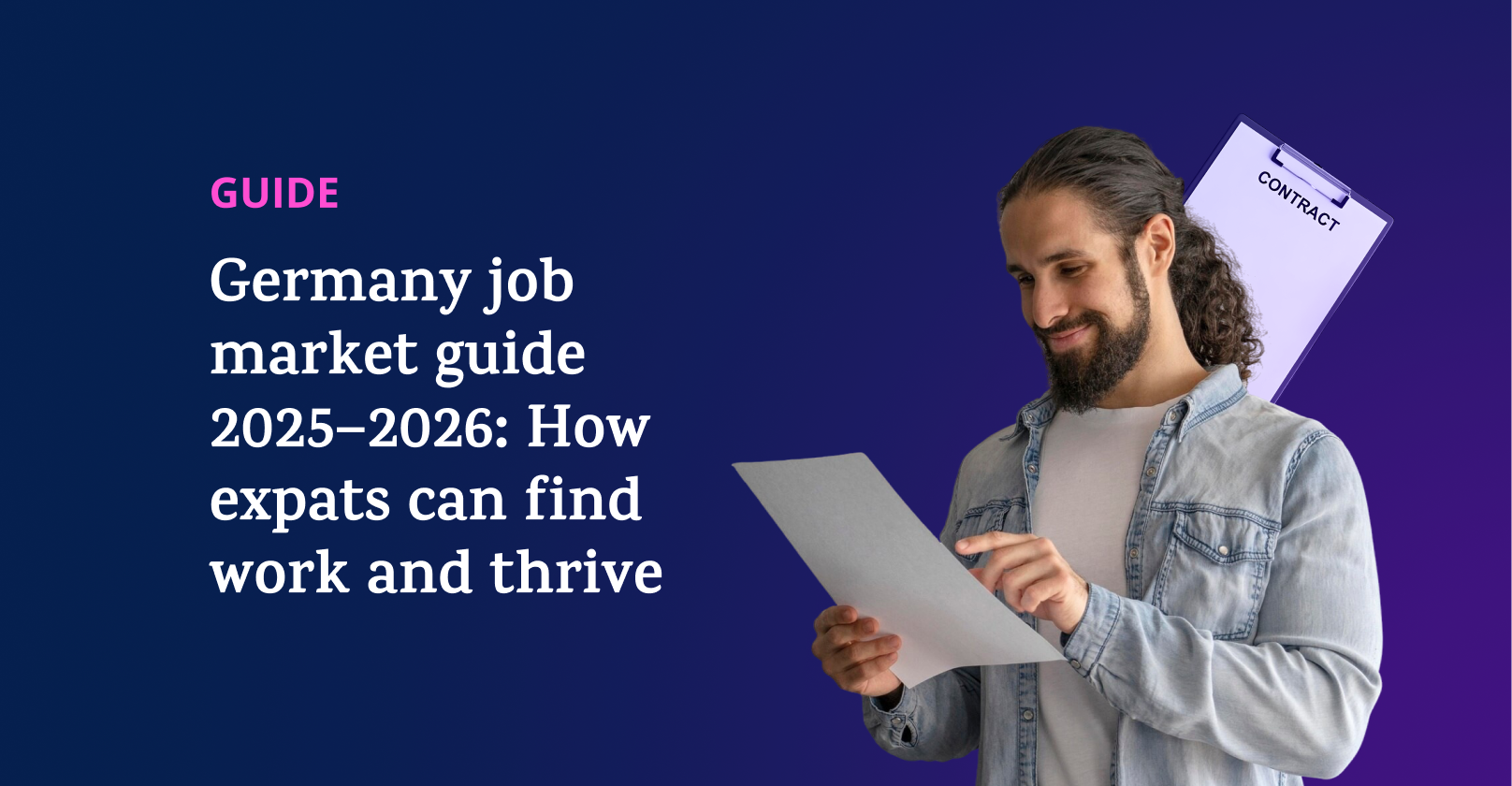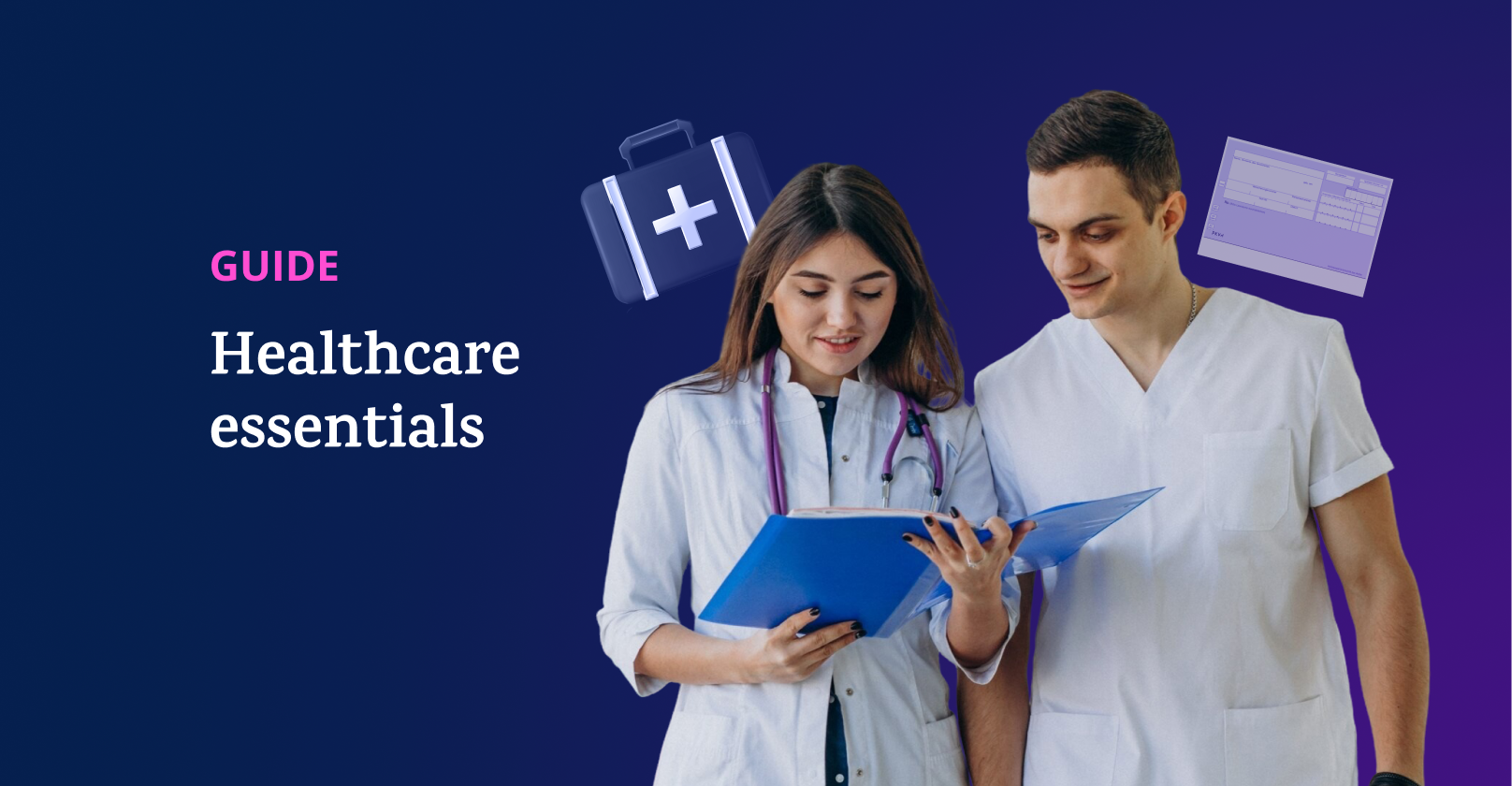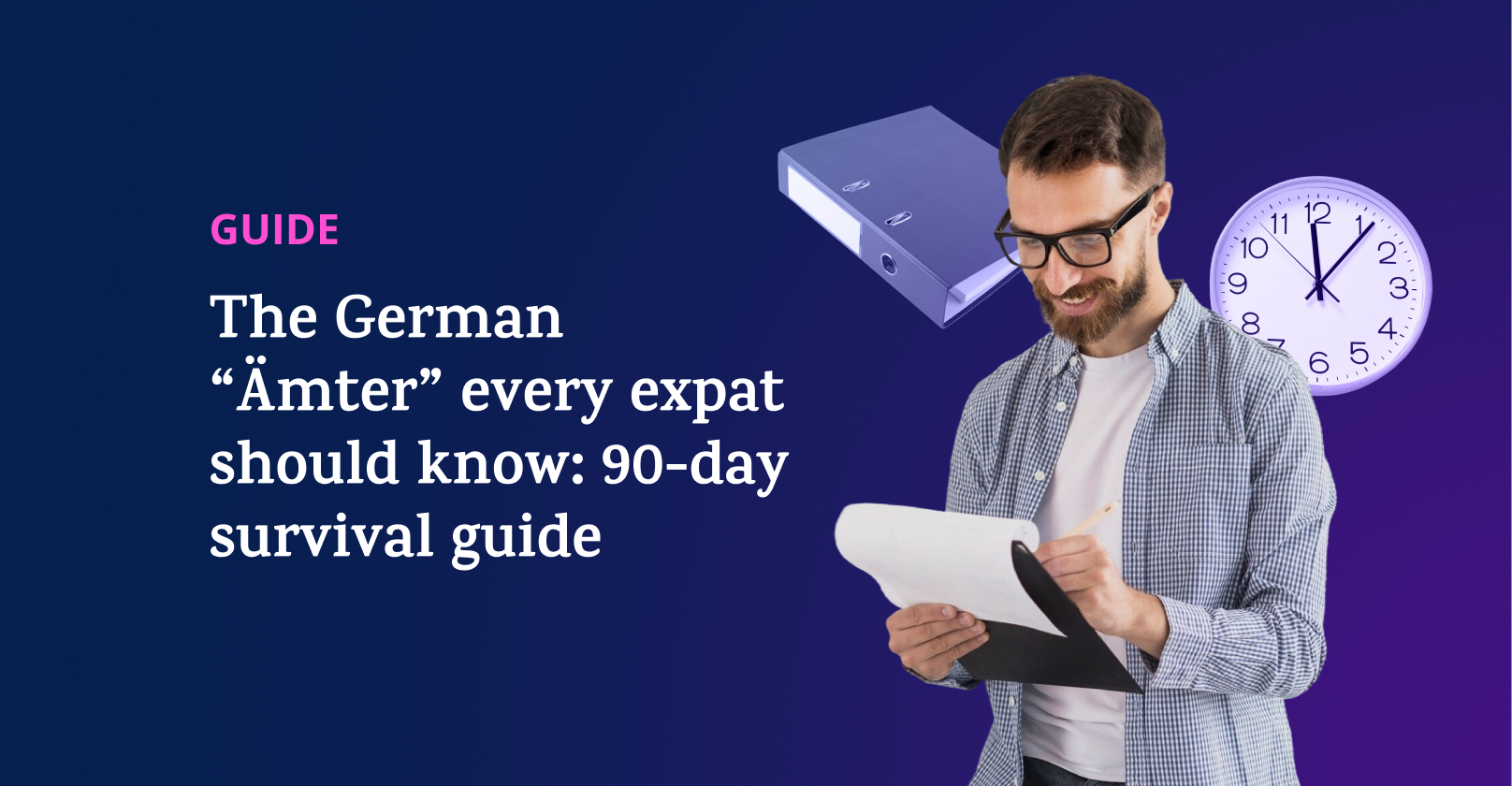Everyday essentials in Germany: The expat handbook for daily life
Moving to Germany is exciting — until your first month hits like a whirlwind of forms, rules and cultural curveballs. Suddenly, you’re Googling how to recycle yogurt cups and wondering why your washing machine has “quiet hours.”
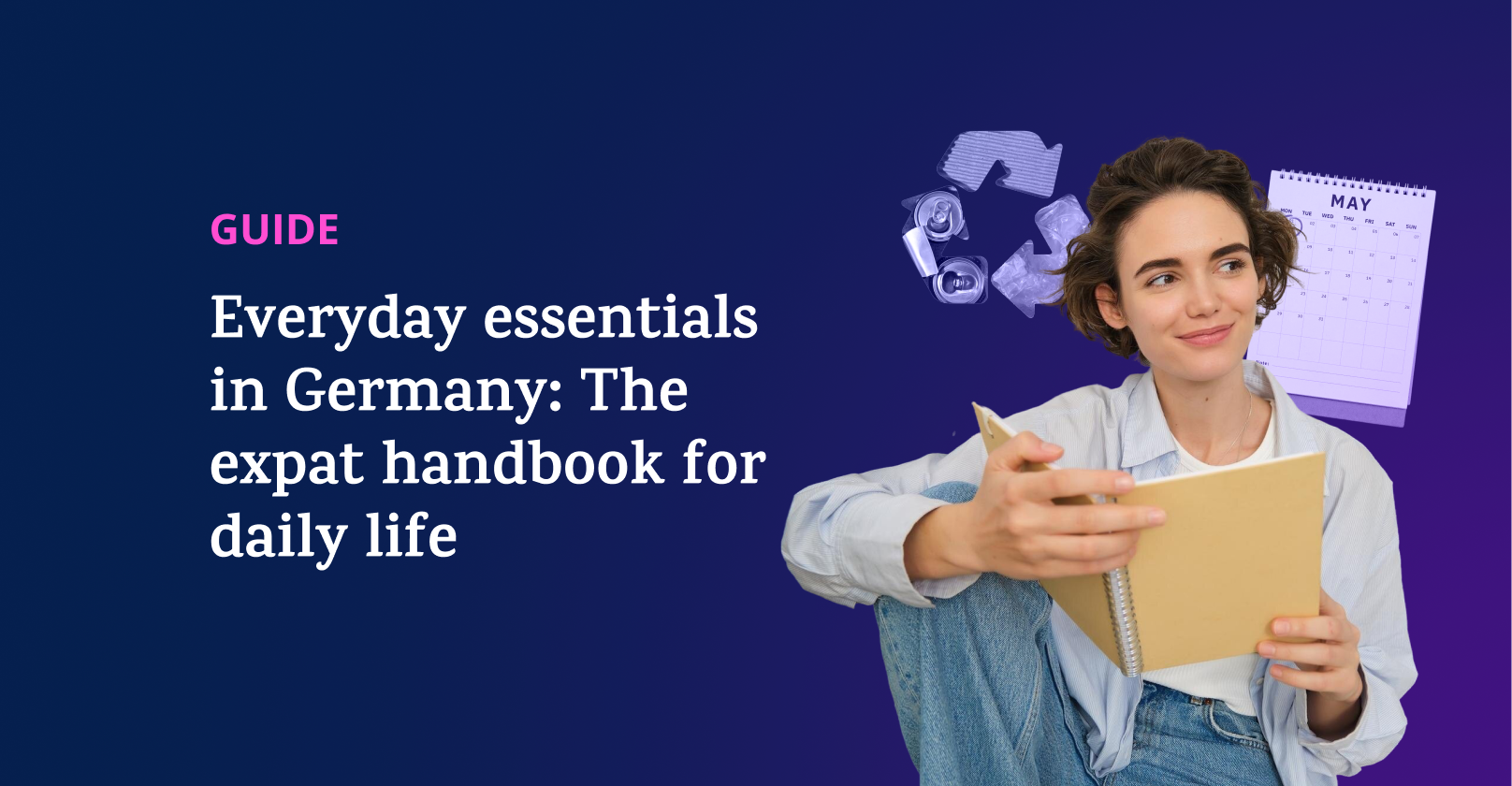
Everyday life in Germany runs on structure and rules you didn’t know existed. But what seems overwhelming in the short term just takes some adjusting. Call it the “Germany effect”: you’ll roll your eyes at the rules now, and defend them in a year.”
This guide is your quick-start manual. It contains everything you actually need to know to live, shop, commute and integrate smoothly. It’s your survival kit with a dash of humor, so you won’t feel lost the first time you try to recycle, register your address or buy bread on a Sunday.
- Bureaucracy and paper trail survival
- Housing, utilities and first contracts
- Communication and banking essentials
- Shopping and everyday errands
- Getting around: Trains, bikes and driving
- Culture, norms and public life
- Pets and apartment life
- FAQs
Bureaucracy and paper trail survival
Welcome to Germany, where efficiency reigns supreme — except when it involves paperwork. You may have arrived with dreams of a digital-first society, but the truth is… bureaucracy here loves the smell of fresh toner.
Don’t worry, we’ll help you survive the paperwork jungle (and maybe even laugh about it).
Why you must check your mailbox daily
Official documents in Germany arrive by post, rather than email. Missing them can lead to fines, lapsed deadlines or lost benefits, so check your physical mailbox daily.
Five letters you’ll get in your first months in Germany
- City registration confirmation (Anmeldebestätigung): Proof that you officially exist and reside where you say you do
- Tax ID letter (Steuer-ID): Contains an eleven-digit number, which is essentially your bureaucratic birth certificate
- Health insurance welcome pack: 20 pages of German, one helpful card
- Rundfunkbeitrag notice (GEZ): The German TV tax. Yes, you pay even if you don’t own a TV.
- Bank correspondence: Sometimes marketing, sometimes rent confirmations. Don’t ignore it.
E-government isn’t fully digital yet
Online services exist, but most require printed signatures, in-person visits and German-language forms.
You might expect the land of the Autobahn and precision engineering to have mastered digital bureaucracy. Cute. While many German offices do have online portals, they often lead to downloadable PDFs that must be printed, signed, scanned and uploaded again.
“Ctrl+C” doesn’t work on German paperwork. Printers, scanners and patience are essential office supplies.
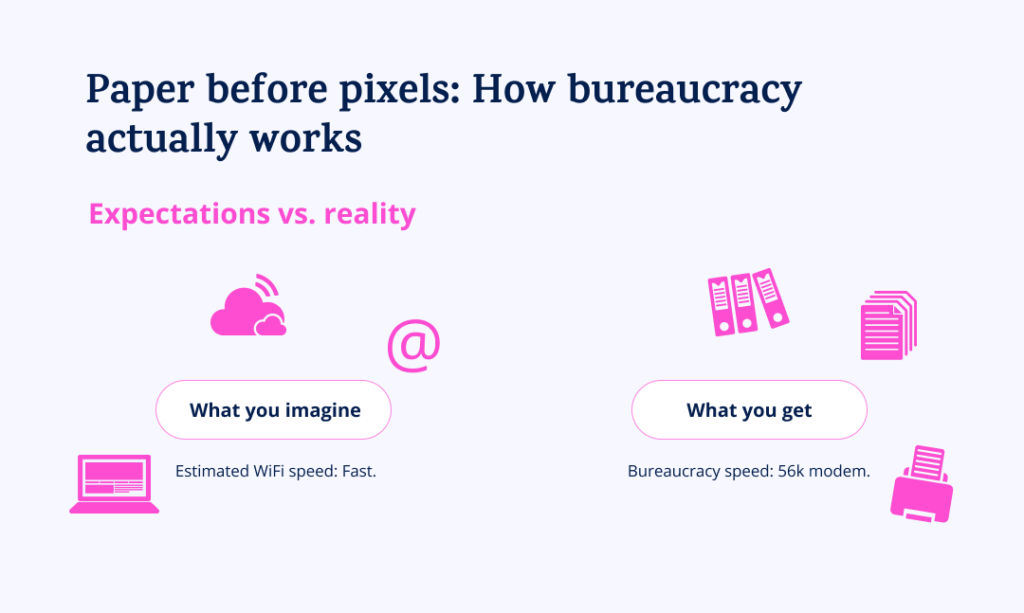
The Bürgeramt portal: What you can (and can’t) do online
Usually online:
- Book Anmeldung or Abmeldung appointments
- Apply for a Meldebescheinigung (registration certificate)
- Download basic tax or insurance forms
Still offline, somehow:
- Submitting signed forms (they want “wet ink”)
- Residence permits and visa applications
So, yes, e-government is coming, just not at WiFi speed. Quite often, you’ll find something online just to discover it must be printed out and submitted by hand. So keep your printer ink stocked, your documents neatly stacked and your sense of humor fully charged.

Housing, utilities and first contracts
Moving into your first German flat? Congrats! Now the real fun begins: setting up the utilities, deciphering contracts and pretending you know what Laufzeit means. (You’ll figure it out.)
Setting up electricity, internet and heating
Utilities in Germany are not automatically hooked up. You’ll need to pick providers for electricity (and often heating) and book internet installation in advance (which can take weeks). Do it early, so your Netflix binge isn’t uncomfortably delayed.
Provider comparison guide
| What to check | Example comparison sites | |
| Electricity and gas | Tariff (€/kWh)Contract length (Laufzeit)Price increasesRenewable vs. standard | Portals such as VERIVOX and CHECK24 let you compare offers by postcode. |
| Internet | Available connection types (DSL, cable, fiber)Speed (Mbit/s)Contract termInstallation timeframe | Guides show major providers (Telekom, Vodafone, 1&1) and what’s typical for expats. |
Glossary: Contract and utility terms you’ll actually need
| German term | What it means |
| der Vertrag | Contract or agreement. Everything in Germany comes with one. |
| die Laufzeit | Duration or term of a contract (typically 12–24 months) |
| die Kündigungsfrist | Notice period, i.e., how far in advance you must cancel a contract |
| die Nebenkosten | Additional costs (heating, water, waste disposal, etc.) paid on top of rent |
| der Abschlag | Monthly prepayment for utilities; adjusted yearly based on your usage |
| der Zählerstand | Meter reading for electricity, gas or water. You’ll report it when moving in or out. |
| der Tarif | Rate or plan (e.g., electricity tariff, mobile tariff) |
| die Grundgebühr | Basic monthly service fee before consumption costs |
| der Stromanbieter/Gasanbieter | Electricity/gas provider |
| der Anschluss | Connection or hookup (for internet, gas or electricity) |
| der Technikertermin | Technician appointment (for installations or meter setups) |
| die Kaution | Security deposit for your apartment (usually two to three months’ rent) |
| die Warmmiete/Kaltmiete | “Warm rent” includes Nebenkosten; “cold rent” is just the base rent |
| der Verbrauch | Consumption or usage; what your utility bill is based on |
| das Zählernummer | Meter ID number; appears on your contract or on the meter itself |
| der Umzug | Move or relocation; the trigger for updating all your contracts and addresses |
Pro tip: When you move into a flat, ask your landlord which utilities are included in the Nebenkosten (additional costs). If electricity is not included, you’ll want to apply right away. Some providers need on-site activation.
‘Rundfunkbeitrag’: The broadcasting tax
Every household in Germany must pay the Rundfunkbeitrag (broadcasting tax), regardless of whether you use or own a TV or radio. Yes, even your unplugged screen counts.
Key facts:
- Fee is €18.36/month per household as of 2025
- Collected by Beitragsservice, not your landlord
- Applies per household (one flat = one fee)
- If you don’t pay, you may receive collection notices (and they are persistent)
Pro tip: You’ll usually be registered when you do your Anmeldung at the town office. If someone else in the flat already pays, they’ll notify the Beitragsservice. Just double-check to avoid two bills.
Sorting trash in Germany
Waste in Germany must be separated into Bio (organic), Gelber Sack/Tonne (plastic and packaging), Papier (paper), Restmüll (residual) and color-sorted glass.
Yes, your neighbors will notice if you cheat, and they will talk about it.
| Bin | What goes in |
| Bio (brown/green) | Vegetable peels, coffee grounds, garden waste |
| Gelber Sack/Tonne (yellow) | Plastic packaging, metal cans, composites with “Grüner Punkt” mark |
| Papier (blue/bin) | Newspapers, cardboard, office paper |
| Restmüll (grey/black) | Items that can’t be recycled elsewhere |
| Glas (weiss/grün/braun containers) | Clear glass (white bin), green, brown for colored glass |
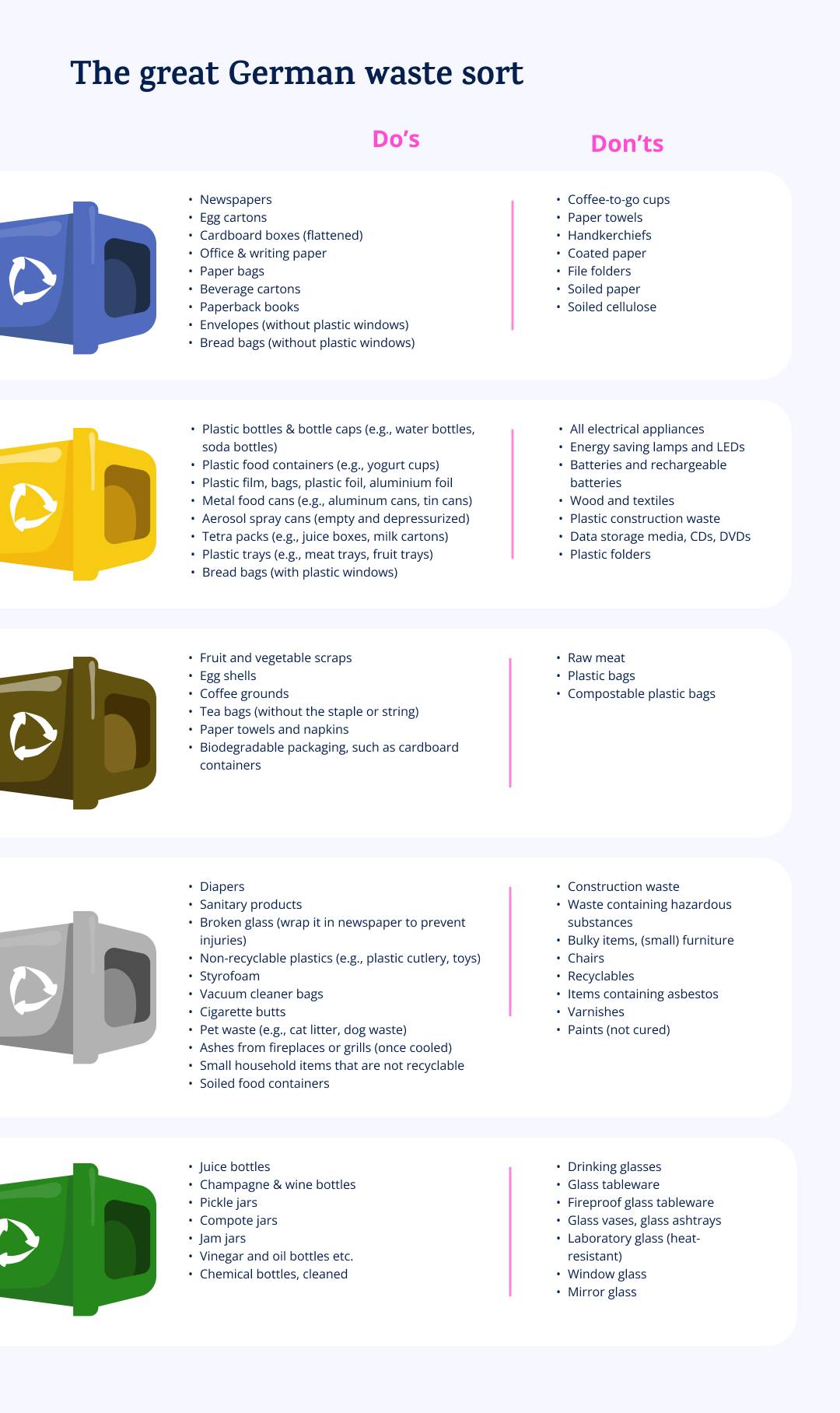
Top 3 mistakes new expats make:
- Using plastic bags for Biomüll. In many places only paper bags are allowed.
- Putting wet/soiled cardboard in the Papier bin. This should go to Restmüll if it’s too dirty.
- Ignoring color-coded glass containers or mixing deposit bottles with non-deposit ones. This can lead to confusion or fines.
Pro tip: Keep a small “recycling cheat sheet” on your fridge. Your flatmates and neighbors will thank you (or at least stop giving you the stink eye).
Communication and banking essentials
Welcome to the land where WiFi passwords are long, contracts are longer and some cafés still don’t take cards. Here’s how to stay connected and caffeinated without losing your mind.
Getting a SIM card and mobile contract
Prepaid SIM cards are the easiest way to get started in Germany. Long-term mobile contracts are cheaper per month, but they require a German bank account, proof of address and ID verification.
Prepaid vs. contract: Quick comparison
| Prepaid SIM | Mobile contract | |
| Best for | New arrivals, short stays, flexibility | Long-term residents, steady income |
| Setup | Buy at supermarkets, phone shops, or online (activate with ID) | Requires credit check, Anmeldung, and German bank account |
| Payment | Top up manually or via app | Automatic monthly billing |
| Data and call rates | More expensive per GB | Cheaper overall, better bundles |
| Cancellation | Cancel anytime | Usually 24-month Laufzeit with 1–3-month Kündigungsfrist |
| Popular providers | Telekom, Vodafone, O₂, Aldi Talk, Lidl Connect | Telekom, Vodafone, O₂, 1&1, Congstar |
Pro tip: Don’t wait until moving day to get connected. SIM activation can take a few hours (or days). Start early so you can Google your way through your Anmeldung instead of wandering offline.
Glossary of telecom terms
| German term | What it means |
| die Prepaid Karte | SIM you top up manually, great for flexibility |
| der Vertrag | Contract; often 12–24 months |
| die Laufzeit | Contract term (duration) |
| die Kündigungsfrist | Notice period to cancel a contract |
| die PostIdent/VideoIdent | ID verification process; required to activate SIMs or contracts |
| das Datenvolumen | Data allowance per month |
| die Flatrate | Unlimited or fixed-price plan for calls, texts or data |
| die Rufnummernmitnahme | Phone number portability (i.e., keeping your old number) |
| die Netzabdeckung | Network coverage; varies by region |
| die SIM-Karte | Your golden ticket to communication (stash it in a safe place) |
Useful comparison sites:
- check24.de: Compare prepaid and contract plans.
- verivox.de: Search offers by data, provider and coverage.
Why you should always carry cash
Many smaller shops, cafés and restaurants in Germany still don’t accept cards. Debit cards (EC-Karte or Girocard) work better than foreign credit cards, but cash is still king — especially outside big cities. That croissant won’t wait while you sprint to the nearest ATM.
Quick facts:
- Some bakeries, bars and Imbisse (snack stands) still operate as Nur Barzahlung (cash only).
- Even when cards are accepted, foreign credit cards (like Visa or American Express) can fail at older terminals.
- Always carry small change. Many toilets, ticket machines and vending spots still need coins.
Mini phrase guide
| German Phrase | What it means |
| Nur Barzahlung | “Cash only.” It’s the sign you’ll see seconds after pulling out your card. |
| die EC-Karte/Girocard | German debit card; widely accepted |
| Kartenzahlung möglich | “Card payment is possible.” The happiest words in small shops. |
| Kein Mindestbetrag | “No minimum spend.” Use your card freely! |
| der Automat | ATM or vending machine; sometimes both |
How much cash to carry daily:
- In major cities: €30 to €50 usually covers daily expenses.
- In smaller towns: €50 to €80, just to be safe.
Pro tip: Always keep a €1 or €2 coin handy. You’ll need it for shopping carts, lockers and public toilets.
Shopping and everyday errands
If you’ve ever run out of milk at 10 p.m. on a Sunday in Germany, you already know: convenience is a luxury, not a guarantee. Between early closing times, bottle deposits and supermarket etiquette, grocery shopping is practically a cultural experience.
Why everything closes on Sundays
Most shops in Germany are closed on Sundays and public holidays by law. Only stores in train stations, airports, or petrol stations stay open, but they’re pricier than usual.
Sunday is sacred in Germany. It’s not just for rest, but for Ruhezeiten (quiet hours). The entire country powers down. Supermarkets close, deliveries stop and even washing machines enjoy a day-long vacation.
Exceptions:
- Supermarkets and kiosks inside major train stations (Hauptbahnhöfe)
- Petrol station mini-markets (Tankstellen-Shops)
- Airport stores and tourist zones
- The occasional “Verkaufsoffener Sonntag” (special shopping Sunday, held a few times per year)
So, plan ahead. Do your big grocery run on Friday or Saturday. Otherwise it’s yogurt-for-dinner Sunday.
Weekly shopping planner
| Day | Best for | Reminder |
| Monday–Friday | Groceries, admin, errands | Avoid 5 p.m.–7 p.m. rush hour queues |
| Saturday | Stock up for Sunday! | Shops close by 8 p.m. (some much earlier) |
| Sunday | Absolutely nothing | Read, hike or join the queue at the train-station Rewe |
Scenario box: “Caught without milk”
It’s Sunday morning. Your fridge is empty.
Option 1: Train-station supermarket. Expensive, but open.
Option 2: Petrol-station convenience store. Milk might be €3, but caffeine is life.
Option 3: Befriend your neighbor. Offer future cake as a trade.
‘Pfand’: Bottle deposits explained
Most bottles and cans with a Pfand logo include a refundable deposit (usually €0.08–€0.25). You can return them at supermarket machines (Pfandautomaten) to get your money back.
Pfand is Germany’s way of keeping bottles out of landfills and teaching everyone the joy of sorting. You’ll pay the deposit upfront when you buy a drink and get it back when you return the empty container.
How it works (step-by-step):
- Buy a drink with a Pfand logo and pay an extra deposit.
- Save the empty bottles (no crushing, no damage!).
- Take them to a supermarket with a Pfandautomat.
- Feed the bottles one by one into the machine.
- Collect your printed voucher and redeem it at the checkout.
Pfand vs. non-Pfand
| Type | Pfand? | Deposit amount |
| Plastic bottles (water, soda, beer) with Pfand logo | Yes | €0.25 |
| Glass bottles (beer, some juices) with Pfand logo | Yes | €0.08–€0.15 |
| Wine bottles, milk cartons, juice boxes | No | €0 |
| Cans with Pfand logo | Yes | €0.25 |
| Imported bottles without logo | No | €0 |
Pro tip: Always check for the word Pfand or the circular recycling logo before tossing a bottle. In some neighborhoods, leaving returnables beside public bins is also common. Collectors will gladly redeem them.
Getting around: Trains, bikes and driving
Germany takes transportation seriously. At least in theory. The trains are legendary (for running late), the cyclists are fearless and the drivers… Well, they’ve got the Autobahn. Whether you’re figuring out your first U-Bahn ticket or trying not to mix up the bike lane with the sidewalk, here’s how not to get lost (or fined).
Validate your ticket — or pay the fine
Most local train and tram tickets must be validated before travel. If it’s not stamped, it’s not valid — even if you just bought it. The fine, as of November 2025, is €60, payable on the spot. The only exception: digital tickets bought in the DB Navigator app (or regional transport apps). Those are validated as soon as you purchase them for use.
In Germany, ticket inspectors (Kontrolleure) move in mysterious ways. They don’t wear uniforms or announce themselves. And, almost inevitably, they appear exactly when you’re least prepared.
How to avoid a €60 life lesson:
- Buy your ticket from a machine.
- Look for a small red or yellow validation machine (Entwerter) before boarding.
- Insert your ticket. You’ll hear the satisfying chunk of official approval.
- Keep it handy until you exit the train.
Phrase tip:
Wo ist der Entwerter? (Where’s the validation machine?)
If you’re using a digital ticket (like the Deutschlandticket), validation isn’t needed and your app does the heavy lifting.
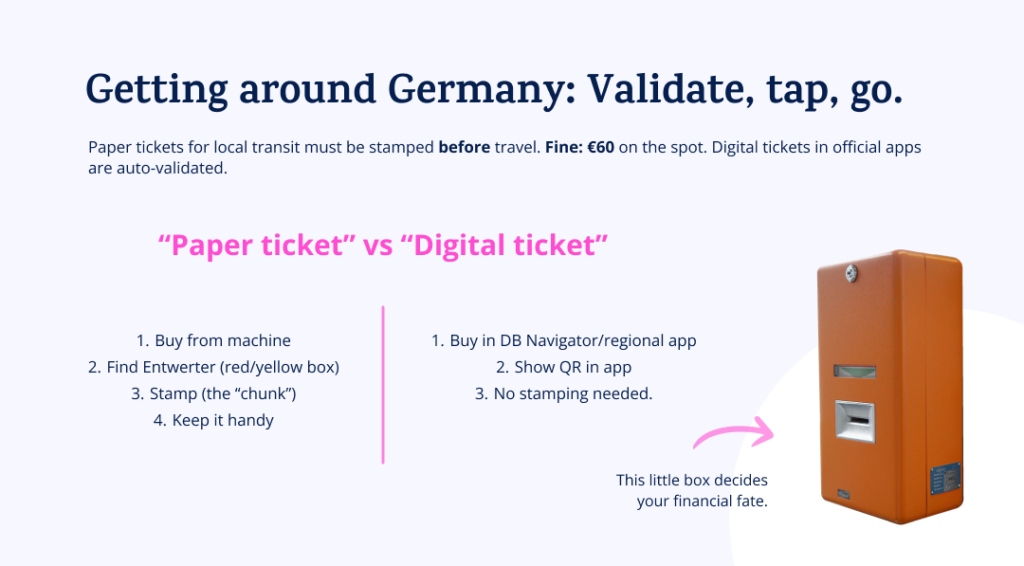
The ‘Deutschlandticket’: unlimited local travel
The Deutschlandticket is a monthly pass for unlimited travel on local and regional transport across Germany. It costs €58 (as of 2025), renews automatically and can be canceled monthly. Think of it as your golden ticket to regional travel. Just remember to cancel it if you aren’t taking full advantage of the benefits — before it eats your bank account.
What’s included:
- All local and regional trains (S-Bahn, U-Bahn, Regionalbahn, Regionalexpress)
- Buses, trams, and ferries (if part of local networks)
- Nationwide validity
What’s not included:
- Long-distance trains (IC, EC, ICE)
- Private operators (FlixTrain, FlixBus, etc.)
Checklist: Who benefits most
- Daily commuters
- City-hoppers and weekend travelers
- Freelancers and digital nomads with flexible work setups
- People who like collecting ticket inspectors’ smiles
Pro tip: Buy and manage it via the DB Navigator app or your local transport provider. Set a reminder before the end of the month if you don’t want it to auto-renew.
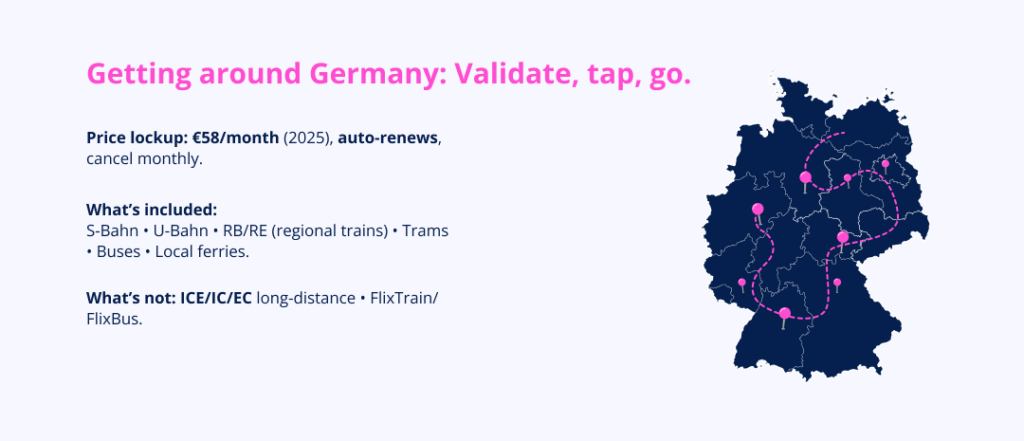
Cycling rules expats need to know
Cyclists generally must follow the same traffic laws as cars. Use designated bike lanes, obey signals and always have front and rear lights. Riding on sidewalks or at night without lights can lead to fines. Ring your bell, not your lawyer.
Germany loves cyclists, but it also loves rules. Here’s how to stay on the good side of both.
Cycling do’s and don’ts
| Rule/Offense | Fine | Tip |
| Riding without lights | €20–€35 | Install a cheap front/rear set. Police check at night. |
| Using your phone while riding | €55 | Text later. Multitasking is not a sport. |
| Running a red light | €60–€100 | Yes, they really will stop you. |
| Riding on the sidewalk | €15–€25 | Unless the path is marked for bikes (Radweg), stay on the street. |
| No bell/no hands on handlebars | €15–€25 | Yes, seriously, the bell is mandatory. |
Quick rental tips:
- Swapfiets: Subscription bikes with included maintenance (look for the blue front tire).
- Call a Bike/Nextbike: City bike rentals via app; available across major cities.
- Tier/Lime: E-bike options — just mind the parking zones.
Driving with a foreign license
Foreign licenses are valid in Germany for six months after establishing residence. After that, you may need to convert it to a valid German license (Umschreiben). Rules differ by country. Some require a written or practical test.
What you need to know:
- EU/EEA licenses are valid indefinitely; no conversion needed.
- Non-EU licenses are valid for six months, after which you must apply for conversion.
- Some countries (e.g. USA, Canada, Australia) have reciprocal agreements that simplify the process. Others require a written or driving test at your local Fahrerlaubnisbehörde (driving license authority).
Timeline checklist:
- Within the first six months: Your home license is fine.
- After six months: Apply for conversion if staying long-term.
To apply for a license, bring your passport, residence certificate (Meldebescheinigung), a biometric photo and a translation of your license. You may also need to book a test, if required.
EU → keep driving → smile
Non-EU (agreement) → convert easily
Non-EU (no agreement) → prepare for tests
Pro tip: Always carry your license and ID while driving. The German police will ask.
Culture, norms and public life
Germany is wonderfully predictable once you get the rhythm. Think structured workdays, quiet Sundays and a surprising number of public holidays on which the entire country just… vanishes. Add in an unapologetic sauna culture, and you’ve got a society that takes both rules and relaxation very seriously.
Sauna culture: Naked and normal
In Germany, nudity in mixed saunas is completely normal. It’s about hygiene and relaxation, not sexuality. Towels, eye contact and calm etiquette are your best friends.
Saunas (Saunen) in Germany are sacred spaces of wellness. Everyone is equal in these spaces, where titles and clothing don’t apply. The etiquette is simple enough: be clean, be quiet, be cool (or try, at least).
What to expect:
- You’ll shower before entering.
- You’ll sit or lie on your towel (no direct contact with the wood).
- Everyone is nude and no one cares.
- Talking is kept to a minimum; phones are banned.
- Couples or groups mix freely.
Mini etiquette guide:
- Bring two towels: one for sitting, one for drying off.
- Don’t stare (you’ll stand out more than anyone else).
- Avoid perfume, loud voices or splashing water unless part of an Aufguss (steam ritual).
Germany’s saunas are about letting go. If you can survive your first Aufguss, you’ve officially earned your cultural integration badge.
Public holidays: Why planning ahead matters
On most public holidays, shops, offices and even most restaurants close completely. Dates vary by state (Bundesland), so always check your region’s calendar before scheduling errands or trips.
Public holidays are the ultimate test of preparedness. One minute you’re planning to pick up groceries, the next you’re staring at locked doors and a note that says “Wir haben geschlossen.”
How to survive:
- Always stock up the day before. Often even bakeries close early.
- Trains and buses run on Sunday schedules (translation: fewer, slower).
- Pharmacies rotate “emergency service” shifts. Look for the posted Notdienst list.
- Holiday dates differ by state, so what’s closed in Munich might be wide open in Berlin.
Main nationwide holidays
| Holiday | Date (2025) | Notes |
|---|---|---|
| Neujahr (New Year’s Day) | Jan 1 | Fireworks and fresh starts |
| Karfreitag (Good Friday) | Apr 18 | Quiet day; no parties or loud music allowed |
| Ostermontag (Easter Monday) | Apr 21 | Family day; shops closed |
| Tag der Arbeit (Labor Day) | May 1 | Expect parades and demonstrations |
| Christi Himmelfahrt (Ascension Day) | May 29 | Doubles as “Fathers’ Day” for beer hikes |
| Pfingstmontag (Whit Monday) | Jun 9 | Long weekend alert |
| Tag der Deutschen Einheit (Unity Day) | Oct 3 | National holiday; museums and monuments are open, shops are not |
| 1. Weihnachtstag and 2. Weihnachtstag (Christmas Days) | Dec 25–26 | Everything stops. Eat, nap, repeat. |
Regional extras:
- Reformationstag (Oct 31): Celebrated in many northern and eastern states.
- Fronleichnam (Corpus Christi, Jun 19): Celebrated in Bavaria, Baden-Württemberg and parts of North Rhine-Westphalia.
- Mariä Himmelfahrt (Aug 15): Celebrated mainly in Bavaria and Saarland.
Pro tip: Treat public holidays like mini hibernations: plan, prep and enjoy the pause. In Germany, rest isn’t just allowed — it’s scheduled.
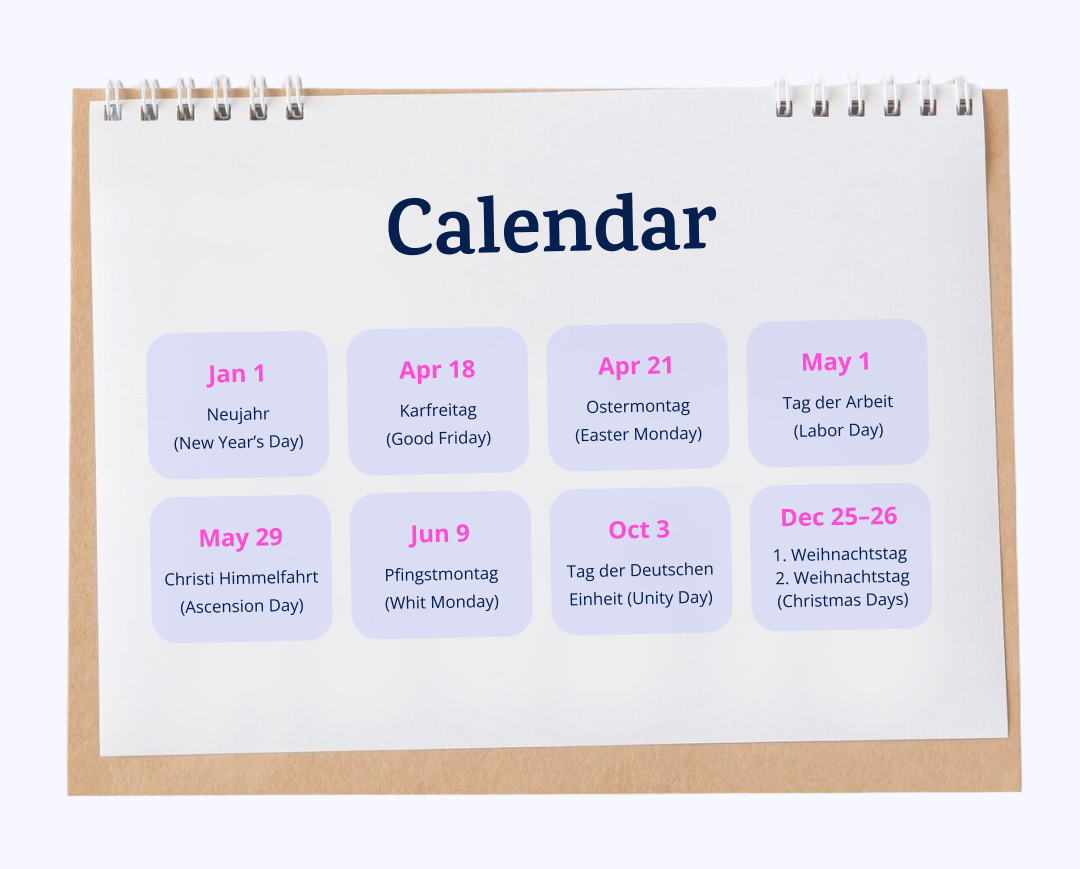
Pets and apartment life
Having a pet in Germany can be deeply rewarding, but it’s also surprisingly bureaucratic. From registration and insurance to leash laws and apartment rules, owning a dog (or any pet) here comes with its own set of responsibilities. In fact, your dog may need more paperwork than you.
The good news? Once you’ve ticked the right boxes, your furry companion can live a happy, rule-abiding life right alongside you.
Registering your dog (and the tax)
All dogs in Germany must be registered with the Ordnungsamt (local public order office). The annual Hundesteuer (dog tax) usually ranges from €90–€150, depending on the city.
Step-by-step guide:
- Register your address (Anmeldung). You’ll need this first.
- Register your dog at the Ordnungsamt within two to four weeks.
- Pay the dog tax (Hundesteuer). Some cities offer discounts for adopted or service dogs.
- Get your dog tag (Hundemarke). It’s your proof of payment and your dog’s official badge of honor.
What you’ll need:
- ID or passport
- Proof of residence (Meldebescheinigung)
- Adoption or purchase documents
- Proof of liability insurance (in some states)
Regional tax variations
| City | Approx. annual tax |
| Berlin | €120 |
| Munich | €100 |
| Hamburg | €90 |
| Frankfurt | €102 |
| Cologne | €156 |
| Leipzig | €90 |
Dog liability insurance rules
Dog liability insurance (Hundehaftpflichtversicherung) is mandatory in many states and highly recommended everywhere. It covers any damage or injury your dog may cause to people, property or other pets.
Accidents happen, even with the best-behaved pups. Whether it’s a knocked-over bike, chewed-up shoe or surprise garden excavation, dog liability insurance can save you thousands. It may seem like a burden, but it’s still cheaper than replacing your neighbor’s sofa.
Example scenarios
| Situation | What happens | Does insurance cover it? |
| Your dog bites another dog at the park | Vet bills, mediation, possible fines | Yes |
| Your dog runs into traffic, causing an accident | Car repair costs | Yes |
| Your dog chews your own furniture | Aesthetic (and/or emotional) damage only | No |
| Your dog scares a cyclist who falls | Medical and property damage | Yes |
Pro tip: Annual premiums usually start around €50–€100, which is a small price for peace of mind (and intact friendships).
Leashes, muzzles and apartment restrictions
Rules vary by state and apartment building. In many cities, leashes are required in public areas, and muzzles are mandatory on public transport or for certain breeds.
Leash and muzzle basics
| Where | Leash required? | Muzzle required? |
| Parks/city streets | Usually yes | Unless restricted breed |
| Public transport | Yes | Often (Berlin, Hamburg, Munich) |
| Forests/trails | Check local signs | Rarely |
| Playgrounds, cemeteries | Dogs not allowed | — |
Apartment policies checklist:
- Check your lease (Mietvertrag). Pets may require written landlord approval.
- Some buildings allow “small pets only” (Kleintiere). Dogs of any size may not count.
- Always inform your landlord when you adopt or move in with a pet.
- Respect Ruhezeiten. Barking during quiet hours is taken seriously.
Pro tip: Always carry your dog’s papers when traveling or using public transport. Germans love documentation almost as much as dogs love treats.
Pet culture in Germany
Well-trained dogs are welcome in public spaces like cafes, shops and even offices. But rules are strictly enforced. Respect, cleanliness and control are the holy trinity of German pet etiquette. On the plus side, a dog on good behavior is practically a VIP.
Pet etiquette 101:
- Always keep your dog leashed unless you’re in a clearly marked Hundefreilaufzone (off-leash area).
- Pick up after your dog. Immer. Many cities have free bag dispensers (Hundetoiletten).
- Ask before letting your dog approach others. Not everyone’s a dog person.
- Keep barking under control, especially during Ruhezeiten (quiet hours).
Phrase guide: Pet-related signs
| German Phrase | Meaning |
| Hunde verboten | Dogs not allowed |
| AnleinpflichtHunde an die Leine! | Dogs must be leashed |
| Hundefreilaufzone | Off-leash dog area |
| Bitte Hundekot entfernen | Please clean up after your dog |
| Hier kein Hundeklo! | Not a dog toilet (often next to someone’s roses) |
Dog-friendly spaces:
- Most outdoor cafes and beer gardens (ask first)
- Public transport (with leash and muzzle, if required)
- Parks and green areas marked dog-friendly
- Many workplaces. Office dogs are a growing trend.
Pro tip: In Germany, a well-behaved dog is a social passport. Train them well, and doors (literal and cultural) will open. Walking the dog is also a great way to connect with other dog owners.
FAQs
Do I need to register my address (Anmeldung) when I arrive in Germany?
Yes. The Anmeldung is mandatory and needed to get a bank account, mobile contract, insurance, and many official documents.
Are utilities included in German rent?
Usually only some (like water or heating) are included in “Nebenkosten.” Electricity and internet often need to be set up separately.
Are shops really closed on Sundays?
Yes — most shops, supermarkets, and services close on Sundays. Plan grocery shopping ahead or use train-station shops, which often stay open.
What is the “Rundfunkbeitrag," and do I really have to pay it?
It's the mandatory broadcasting fee for public media. Every household must pay it — even if you don’t watch TV.
Are pets allowed in most rental apartments?
Small pets (like hamsters or fish) are usually fine. Dogs and cats often require explicit landlord approval.
From culture shocks to comfort zones
Settling in Germany means learning a mix of official rules and unspoken customs.
Once you’ve survived utilities, SIM cards and cash-only bakeries, the rest becomes easier. The longer you stay, the more these “strange” rules start to make sense and even feel comforting. You’ll find rhythm in recycling schedules, pride in punctuality and maybe even joy in paperwork done just right.
What initially feels like bureaucracy overload can quickly become another part of daily life: from biking with lights to sorting bottles color. Before long, you’ll realize you’re not just living in Germany, you’re living like a German (in the best way).
Trust us: Give it a year, and you’ll be explaining Pfand to the next confused newcomer.

Begin your personal language journey
- Courses tailored to your learning needs
- Qualified teachers, small class sizes
- Expert-designed curriculum
- Live classes with native-level teachers


We do our best to keep this guide accurate and up to date, but rules, processes and information can change quickly.
Lingoda can’t take responsibility for any decisions made based on this content, so we recommend double-checking with official sources.

